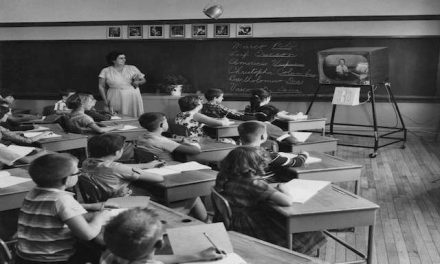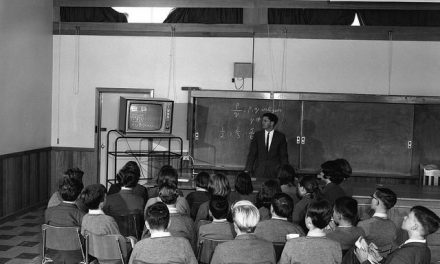Title: Small Screen Food: American Identity Through a Culinary Televisual Lens
Editors: Urszula Niewiadomska-Flis and Carrie Helms Tippen
Proposals (500 words): March 15, 2024
Completed Chapters (7,000 words): August 15, 2024
Salman Rushdie characterized the serial television show “as the novelistic medium of the 21st century,” signifying its emerging importance and elevating its status to a realm traditionally occupied by novels. This shift, propelled by technological advancements and new patterns in media consumption like streaming and binge-watching, highlights televisions’ artistic and cultural importance. Rushdie’s view acknowledges television series as valuable cultural artifacts of considerable artistic depth and cultural weight.
Small Screen Food invites scholars in a variety of fields to contribute to an interdisciplinary volume of essays examining the art of serial television. In Television Studies, scholars engage in a nuanced examination of television as a unique cultural medium. This field goes beyond mere content analysis, employing diverse methodologies to probe television’s influence on societal narratives, cultural norms, and individual identities. Scholars in television studies explore television’s reflection and influence on cultural and social values, considering its role in shaping public consciousness and serving as a platform for ideological discourse. Within this scope, the portrayal of food on small screen reveals myriad ways culinary representations in television series both mirror and shape cultural identities and social dynamics. Rushdie’s comparison of TV series to novels opens pathways for Literary Studies to use the analytical tools and theories of the field to interrogate the genre as long form fiction, giving attention to narrative strategies and structures. This volume also intersects intentionally with the field of food studies, a discipline that delves into the complex interplay between food, culture, and identity. This field of scholarly inquiry examines how food practices and preferences transcend mere sustenance, serving as carriers of cultural heritage, expressions of social status, ethical beliefs, and personal values/ideological commitments. Investigating these aspects, food studies scholars investigate food as a potent symbol of both personal identity formation and cultural expression.
Small Screen Food aims to examine how American identity is represented, revised, and resisted when food features in serial television programs. This collection seeks original projects examining narrative television series (mini or limited series, multi-season series, streaming or mainstream distribution) with fictional (not reality or documentary) storytelling as a central defining feature. Essays should address the role of food and drink in constructing American identity through eating, cooking, serving, or producing food and drink as mechanisms of character development, plot advancement, setting establishment, or major conflict development/resolution. We are interested in the signifying function of food to communicate intersectional identities in American culture at any time or within any subregion. Through examining the narrative significance of food, this collection asks what it means for national identity to be screened through culinary symbols.
Small Screen Food is primarily interested in fictional narrative tools related to literary analysis, following the methodology of Television Series as Literature, edited by Reto Winckler and Víctor Huertas-Martín (Palgrave, 2022). It excludes projects on food in reality TV, cooking shows or cooking competitions, web content, documentaries, or advertisements. These are covered in existing literature like Food TV (Routledge, 2023), Digital Food TV: The Cultural Place of Food in a Digital Era (Routledge, 2022), Food and Cooking on Early Television in Europe (Routledge, 2022), The Food Network Recipe: Essays on Cooking, Celebrity and Competition (McFarland, 2021), Eating Fandom: Intersections Between Fans and Food Cultures (Routledge, 2020), Food Discourse of Celebrity Chefs of Food Network (Palgrave, 2019), Food Television and Otherness in the Age of Globalization (Lexington Books, 2017), From Scratch: Inside the Food Network (Putnam’s Sons, 2013), Food Media: Celebrity Chefs and the Politics of Everyday Interference (Bloomsbury, 2012), and numerous articles. Connections can be made clearer by limiting the genre under analysis to fictional episodic tv.
We invite essays discussing American identity as portrayed in American or international audience-targeted television series. We are interested in essays that discuss how American identity is viewed or constructed by expectations, stereotypes, or conventions in global conversation, but analysis should place food in an American context. Comparative analyses across time (Quantum Leap reboot comparisons), geography/culture (The Office UK vs. US), or media (video game/novel/etc to TV adaptations like The Last of Us) are welcome.
Possible guiding questions include:
- What does food on the small screen tell us about American society and the role of food in defining American identity?
- What does televised food communicate about such identities as: racial, ethnic, class, gender, sexual, religious, regional, immigration status, etc. as expressed in the United States?
- How do creators of TV series use food as a narrative device or a tool for creating elements of story: character, plot, setting, conflict, etc.?
- What parts of the processes of growing, processing, purchasing, preparing, serving, or cleaning food are invisible on television, and what is significant about that absence? What intersecting identities are most often associated with food labor and how? What identities are absent in considerations of food labor? What practical considerations in television production affect the way that characters interact with food on screen? What are the limitations, then, to analysis of food on TV?
We seek analyses exploring binary aspects of identities as reflected through food narratives in American television series, including (but not limited to): rural/urban/suburban/exurban dynamics, private/public foodscapes, professional/amateur culinary identities, notions of inside/outside/ and culinary passing, hunger versus satiety, the concepts of (in)edibility, (un)real culinary experiences, Indoor and outdoor food settings, and Institutional food settings (such as schools, hospitals, prisons, etc). While focusing on national identity, we also welcome intersections with race/ethnicity, class, gender, sexuality, religion, (dis)ability, region, carceral status, and other identity dimensions.
To provide guidance, while not limiting the scope of potential contributions, prospective authors might consider addressing specific television series, such as:
- Analyses of food and regional identity in series like Tremé, Hart of Dixie, Sweet Magnolias, and/ or True Blood
- Explorations of food and racial identity in shows like Jane the Virgin, Prince of Bel Air, Soul Food, Belle’s, The Wire, and/ or Tremé
- Contextualizing food within ethnic/immigrant narratives such as The Sopranos Examining food and religious identity in The Marvelous Mrs. Maisel
- Analyses of class identity through the culinary lens: family meals in series like The Donna Reed Show, Growing Pains, and/ or Modern Family; representations of poverty
through food in Roseanne, ideals of “healthy” family values in shows like Everybody Loves Raymond, and similar series; and finally class distinctions in Medievalesque fantasy of Game of Thrones - Explorations of the evolution of Thanksgiving dinner and Christmas dinner portrayals across various television series as a reflection of changing American values
- contextualizing gender identity through food: feminine masquerade and home economics in Mary Tyler Moore Show, I Love Lucy, and others; the role of drinks (e.g., Cosmopolitan) in gender construction in Sex in the City and Mad Men, Suburban life and ideal femininity in Desperate Housewives
- Analyses focusing on body image, health, and related themes: Portrayals of disorderly eating and eating disorders in American TV series; Body positivity and its challenges in shows like Dietland, Dumplin’, and Insatiable
- Explorations of the culinary “Other” may address: Food in crime dramas and police procedurals, including The Killing, Mare of Eastown, etc.; Intersections of wound culture, serial killers and consumerism in Hannibal; culinary proclivities of zombies in i-Zombie and Santa Clarita Diet; Green revolution and freegans in Portlandia
- Explorations of foodscapes: prisons, schools as seen in series like Orange is the New Black, The Wonder Years, and Gilmore Girls; cafes and bars as microcosms of American society in Happy Days, Monk’s Café (Seinfeld), Central Perk (Friends), Café Nervosa (Frasier), and others; Post-Katrina New Orleans restaurantscape in Tremé; The real-life foodscape of TV series food – Twin Peaks café, Los Pollos Hermanos in LA and NY; Krusty Burger (The Simpsons), Cartman Burger (South Park); Bob’s Burgers;
- Other miscellaneous topics could include: magic realism and nostalgia in Pushing Daisies; light nibbles and nihilism in Seinfeld, food as signifier of virtue in Twin Peaks; Fantasies about food in sci-fi, fantasy, or utopian series like Battlestar Galactica, and/ or Firefly; and others
We invite scholars to delve into these themes or any others, contributing to a richer understanding of how food shapes and is shaped by various identities on American television. Contributions that offer fresh insights into these themes or propose novel angles are particularly encouraged.
Interested authors should submit 500-word proposals and 200-word academic bio as Word documents to Urszula Niewiadomska-Flis and Carrie Helms Tippen at smallscreenfoodbook@gmail.com by March 15, 2024. Please also direct any questions about possible submission topics to this email.
You will be notified whether your proposals are accepted by May 1, 2024. For those invited to contribute to the collection, completed essays of approximately 7,000 words will be due by August 15, 2024.
We welcome contributions from both established and emerging scholars for this collection. We encourage submissions from multiple perspectives and disciplines, emphasizing the diversity of approaches to the subject. Please note that only previously unpublished works will be considered for inclusion.
Our anticipated publication year for the collection is 2025.
About the editors
Urszula Niewiadomska-Flis is Associate Professor at the English Studies, the John Paul II Catholic University of Lublin, Poland. She is the author of four monographs, with her latest work, Race and Repast: Foodscapes in Twentieth-Century Southern Literature, published by the University of Arkansas Press in December 2022. Additionally, she contributed analyses of foodways in hip hop and black farming in the South to the co-authored book Pathologizing Black Bodies: The Legacy of Plantation Slavery, released by Routledge in May 2023.
Carrie Helms Tippen is Associate Professor of English at Chatham University in Pittsburgh, Pennsylvania. Tippen is author of Inventing Authenticity: How Cookbook Writers Redefine Southern Identity and Pain and Pleasure in Southern Cookbooks. She is series editor of the Ingrid G. Houck Series on Food and Foodways at University Press of Mississippi and one of the hosts of the New Books in Food podcast from the New Books Network. Her academic work has been published in Gastronomica, Food and Foodways, Southern Quarterly, and Food, Culture, and Society.





